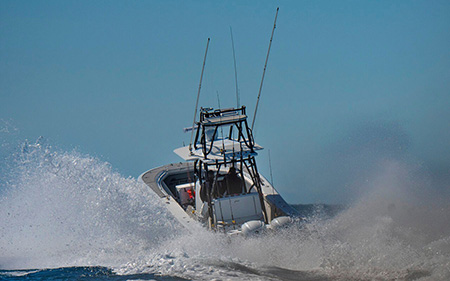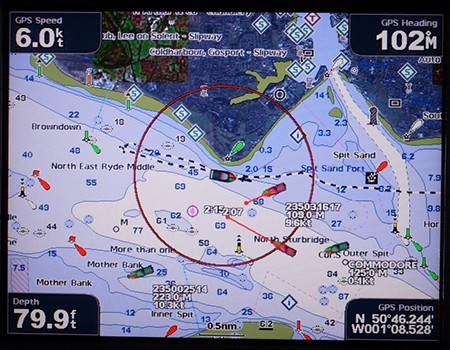
Fast Response Time

Quality Workmanship

Premium Marine Brands

Custom System Design

Online Bookings

Fast Response Time

Quality Workmanship

Premium Marine Brands

Custom System Design

Online Bookings
Author: Rob Franklin Date Posted:13 September 2024
 Benefits of AIS for your vessel
Benefits of AIS for your vesselWhether you're a recreational sailor or a commercial vessel operator, AIS provides the benefit of real-time information about nearby vessels, including their speed, heading, and identification. This data is crucial for preventing collisions, particularly in busy waterways or during poor visibility conditions. With AIS, boat owners can make informed decisions, adjust their course, and avoid potential accidents, contributing to a safer maritime environment.
AIS helps boat owners stay aware of their surroundings by displaying nearby vessels on a chart plotter or a compatible display device. This increased situational awareness is vital when navigating on shipping channels through crowded ports, or unfamiliar waters. Knowing the position of other vessels allows for better planning and maneuvering, reducing stress and uncertainty during your voyage.
As small boat could stop within meters, a large tanker may take a 3000 mtrs or more, so knowing what is on the water when you are, regardless of visibility is crucial to your boating safety. When integrated with an AIS receiver or transceiver, the alarm system continuously monitors the information from surrounding vessels, such as their speed, direction, and proximity to your boat. This functionality is particularly beneficial in busy waterways, during low visibility conditions, or when operating single-handedly. If a nearby vessel presents a potential collision risk — typically determined by parameters like the Closest Point of Approach (CPA) and Time to Closest Point of Approach (TCPA) — the AIS Alarm System triggers an audible or visual alert to warn the captain or crew. This early warning provides valuable time to take evasive action, adjust the vessel’s course, or communicate with the other vessel to prevent a collision. The AIS Alarm System can be customised to specific thresholds, allowing boat owners to set the desired safety margins based on their comfort level, vessel size, and navigating conditions.
 Emergency Response and Search and Rescue (SAR)
Emergency Response and Search and Rescue (SAR)Don't become a statistic! In an emergency, AIS becomes a valuable tool for search and rescue operations. AIS-equipped vessels can broadcast their position to nearby ships and rescue authorities, ensuring a quick response. This feature significantly increases the chances of a successful rescue, providing peace of mind for boat owners and their families.
For commercial boat owners, AIS aids in efficient fleet management by allowing real-time tracking of vessels. This capability enables better coordination, improved logistics, and fuel savings, which can reduce operational costs and increase profitability.
AIS technology offers numerous benefits, from enhancing safety and situational awareness to aiding in emergency situations and improving operational efficiency. It's a smart investment for any boat owner looking to enjoy a safer, more efficient time on the water.
No, AIS is relatively straightforward to set up, especially when done by professionals. At eMarine Solutions, we handle the entire installation process for you, ensuring your system is correctly configured and integrated with your existing equipment. We make it easy so you can focus on enjoying your time on the water!
To set up AIS on your vessel, you’ll need an AIS transceiver (Class A or Class B, depending on your needs), a VHF antenna, and a GPS antenna. You may also require a compatible display device like a chart plotter or multifunction display to view AIS data. Our experts at eMarine Solutions can help you select the right components for your specific vessel and needs.
Yes, in most cases, you can integrate AIS with your existing multifunction display, chart plotter, or fishfinder, provided they are AIS-compatible. Our team can assess your current setup and ensure a seamless integration, so you get the full benefits of AIS without needing to invest in new displays.
AIS signals typically have a range of 10 to 20 nautical miles, depending on factors such as the height of the antennas, weather conditions, and the presence of obstructions. The range can be extended with the help of shore-based AIS stations and satellite AIS, which can track vessels over much greater distances, including across oceans.
AIS information is publicly available and can be viewed by anyone with an AIS receiver. It is primarily intended for safety and navigation, so there is no encryption of the transmitted data. If privacy is a concern, you can opt for AIS Class B Silent mode, which allows you to receive AIS data without transmitting your own position.
AIS can only detect vessels that are equipped with an AIS transponder. Smaller recreational boats, fishing vessels, and some local watercraft may not carry AIS, particularly if they are not required to by law. However a good proportion of larger and fast moving recreational vessels usually carry them and commercial vessels should operate AIS at all times.
Regularly updating your AIS software or firmware is crucial to ensure the system runs efficiently and takes advantage of the latest features and security improvements. Check with your AIS manufacturer for recommended update intervals and follow their guidelines for maintaining your equipment.
AIS works globally, but its effectiveness depends on the availability of AIS receivers, both on vessels and shore stations. In remote areas or far offshore, coverage may be limited to satellite AIS, which can track vessels worldwide but may have some limitations, such as delayed data transmission.
In most countries, you do not need a specific license to operate an AIS transponder if you are using it on a recreational vessel. However, you must ensure your AIS transponder is registered and properly configured with the correct Maritime Mobile Service Identity (MMSI) number. For commercial vessels, AIS use may be subject to specific regulations, and it’s always best to check local maritime authorities for requirements.
See Australian Maritime Regulations on using AIS systems on your vessel here
eMarine Solutions has you covered! We can help you select the correct system components for new and integrated instatllation.
As your trusted AIS experts from the Gold Coast to Bundaberg, we provide:
Contact us today, and let’s get your boat AIS-equipped!